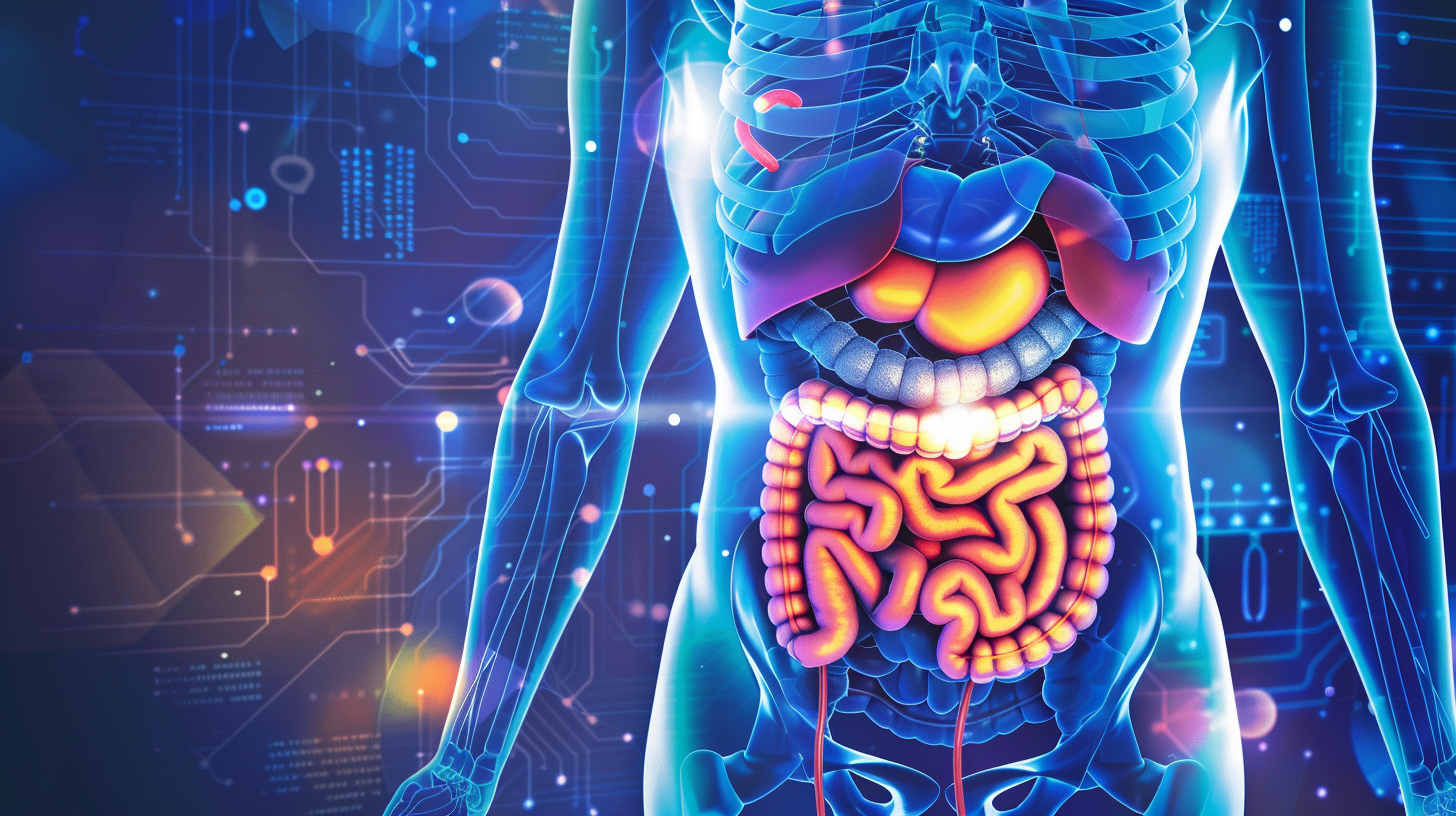Do you ever experience digestive discomfort after meals? Have you ever wondered if your diet could be the culprit behind these issues? The truth is, your digestive health is closely linked to the food you eat. Understanding the connection between digestive discomfort and your diet is key to achieving optimal gut health.
Key Takeaways:
- Your diet plays a significant role in your digestive health.
- Food sensitivities and trigger foods can worsen digestive discomfort.
- Digestive disorders can be influenced by dietary habits.
- Fiber and hydration are crucial for healthy digestion.
- Probiotics and prebiotics can support gut health.

The Digestive System: A Complex Network
The digestive system is a remarkable network of organs and processes that work together to break down food, absorb nutrients, and eliminate waste. It plays a vital role in maintaining overall health and well-being. Understanding the complexity of the digestive system can provide valuable insights into how your diet affects your digestive issues and gut health.
Nutrition plays a crucial role in supporting the health of your gut. The food you consume provides the essential nutrients and energy that your digestive system needs to function optimally. A well-balanced diet that is rich in fiber, vitamins, minerals, and beneficial bacteria can help promote a healthy gut environment. On the other hand, an unhealthy diet high in processed foods, sugars, and unhealthy fats can disrupt the delicate balance of the digestive system and contribute to digestive issues.
“The digestive system is a complex network of organs and processes that work together to break down food, absorb nutrients, and eliminate waste.”
When you consume food, it passes through various stages of digestion. The process begins in the mouth, where enzymes in saliva start breaking down carbohydrates. As the food travels down the esophagus, it enters the stomach where proteins are further broken down by stomach acid and enzymes. From there, it moves into the small intestine where nutrients are absorbed into the bloodstream. Finally, the waste products enter the large intestine, where water is reabsorbed and the remaining waste is eliminated as stool.
An unhealthy diet can disrupt this intricate process and lead to digestive issues such as bloating, gas, constipation, or diarrhea. The lack of fiber in the diet can result in poor bowel movements, while excessive consumption of unhealthy fats can slow down digestion. Moreover, a diet high in refined sugars and processed foods can contribute to imbalances in gut bacteria, leading to inflammation and a weakened gut barrier.
By adopting a diet that focuses on whole, unprocessed foods and includes a variety of fruits, vegetables, whole grains, lean proteins, and healthy fats, you can support the health of your digestive system. This can help alleviate digestive issues and promote optimal gut health. Additionally, staying hydrated and managing portion sizes can also positively impact digestion.
Understanding the Nutritional Implications on Gut Health
Research shows that the health of your gut plays a crucial role in overall well-being, impacting various aspects of health such as immune function, mental health, and even weight management. A healthy gut is characterized by a diverse and balanced gut microbiota, which consists of trillions of microorganisms.
The trillions of bacteria, fungi, and other microorganisms in your gut play a significant role in digestion, nutrient absorption, and immune function. They help break down complex carbohydrates, produce vitamins, and regulate the immune response. Imbalances in the gut microbiota, known as dysbiosis, can lead to digestive issues and may contribute to the development of conditions such as irritable bowel syndrome (IBS) or inflammatory bowel disease (IBD).
The integrity of the gut barrier is also crucial for optimal gut health. The cells that line the intestines form a protective barrier, allowing the absorption of nutrients while keeping harmful substances out. An unhealthy diet, high in processed foods and low in fiber, can weaken this barrier, leading to increased intestinal permeability or “leaky gut.” This can allow harmful bacteria and toxins to enter the bloodstream, triggering inflammation and potentially contributing to digestive issues.
By optimizing your diet to support gut health, you can positively influence the composition of your gut microbiota and strengthen the gut barrier. Including probiotic-rich foods, such as yogurt and fermented vegetables, can introduce beneficial bacteria into your gut. Prebiotic foods, such as onions, garlic, and whole grains, provide the necessary fuel for these beneficial bacteria to thrive.
Identifying Food Sensitivities and Trigger Foods
When it comes to digestive discomfort, understanding the role of food sensitivities and trigger foods is crucial. Food sensitivities refer to the body’s adverse reactions to certain types of foods or ingredients, which can negatively impact digestion. These sensitivities can vary from person to person, making it essential to identify your specific triggers. By recognizing and eliminating trigger foods from your diet, you can significantly improve your digestive health.
The Impact of Food Sensitivities on Digestion
Food sensitivities can manifest in various ways, including bloating, abdominal pain, diarrhea, or constipation. These symptoms can be uncomfortable and disrupt your daily life. Identifying the foods that trigger these symptoms is key to managing and alleviating digestive discomfort. Keep in mind that food sensitivities can be challenging to pinpoint, as they may not cause immediate or severe reactions like food allergies. Therefore, it is beneficial to keep a food diary to track your symptoms and potential triggering foods.
“Food sensitivities can vary from person to person, making it essential to identify your specific triggers.”
How to Identify Trigger Foods
When it comes to identifying trigger foods, there are several approaches you can take. One common method is an elimination diet, where you remove potentially problematic foods from your diet for a period, then gradually reintroduce them one by one to observe any reactions. This process helps identify which specific foods are causing digestive discomfort.
Another approach is to undergo food sensitivity testing, which can provide valuable insights into the foods that your body may be reacting to. There are various types of tests available, including blood tests and skin prick tests, that can help identify specific sensitivities.
Benefits of Identifying Trigger Foods
Identifying trigger foods and managing food sensitivities can have significant benefits for your digestive health. By eliminating the foods that cause discomfort, you can reduce symptoms such as bloating, gas, and bowel irregularities. This, in turn, can lead to improved overall gut health and better digestion.
Moreover, identifying trigger foods allows you to make informed dietary choices. By knowing which foods to avoid or moderate, you can create a balanced and digestion-friendly diet that supports optimal digestive function.
Summary
Identifying food sensitivities and trigger foods is a crucial step in managing digestive discomfort. With the right approach, such as an elimination diet or food sensitivity testing, you can determine the specific foods that may be causing digestive issues. By eliminating these triggers from your diet, you can experience improved digestive health and greater overall well-being.

Understanding Digestive Disorders
When it comes to digestive health, understanding the different disorders that can affect your system is crucial. Digestive disorders can range from mild discomfort to chronic conditions that significantly impact your daily life. While these disorders may have various causes, it is essential to recognize the role that dietary habits play in their development and severity. By taking a personalized approach to managing digestive disorders through diet, you can potentially alleviate symptoms and improve your overall well-being.
Common Digestive Disorders
There are several common digestive disorders that individuals may experience. These disorders can have different causes and affect different parts of the digestive system. Here are some examples:
- Gastroesophageal Reflux Disease (GERD): This disorder occurs when stomach acid flows back into the esophagus, causing heartburn and acid reflux.
- Irritable Bowel Syndrome (IBS): IBS is a chronic disorder that affects the large intestine, causing symptoms such as abdominal pain, bloating, diarrhea, and constipation.
- Celiac Disease: This autoimmune disorder is triggered by the ingestion of gluten. It damages the small intestine and can lead to malabsorption of nutrients.
- Inflammatory Bowel Disease (IBD): This term encompasses conditions like Crohn’s disease and ulcerative colitis, which involve chronic inflammation of the digestive tract.
| Digestive Disorder | Symptoms | Treatment |
|---|---|---|
| Gastroesophageal Reflux Disease (GERD) | Heartburn, acid reflux | Medications, lifestyle changes, avoiding trigger foods |
| Irritable Bowel Syndrome (IBS) | Abdominal pain, bloating, diarrhea, constipation | Dietary modifications, stress management, medication |
| Celiac Disease | Abdominal pain, diarrhea, malabsorption | Strict gluten-free diet, nutritional supplements |
| Inflammatory Bowel Disease (IBD) | Abdominal pain, diarrhea, rectal bleeding | Medications, lifestyle changes, surgery in severe cases |
It is important to note that these disorders may have different causes, and while dietary habits can play a significant role, they are not the sole determining factor. Consulting with a healthcare professional is crucial in diagnosing and managing these conditions effectively.
The Impact of Diet on Digestive Disorders
Dietary habits can have a significant impact on the development and severity of digestive disorders. Certain foods may trigger or exacerbate symptoms, while others may promote healing and alleviate discomfort. Understanding your personal triggers and the dietary changes that can help manage your specific digestive disorder is essential.
“A healthy diet tailored to your specific digestive disorder can greatly improve your overall quality of life.”
– Dr. Samantha Anderson, Gastroenterologist
For example, individuals with GERD may benefit from avoiding spicy foods, citrus fruits, caffeine, and carbonated beverages, as these can trigger acid reflux symptoms. On the other hand, individuals with IBS may find relief by following a low FODMAP diet, which involves restricting certain carbohydrates that can contribute to bloating and gastrointestinal symptoms.
By working with a healthcare professional or registered dietician, you can create a personalized diet plan that caters to your specific digestive disorder’s needs. This may involve eliminating trigger foods, incorporating gut-friendly ingredients, and ensuring adequate nutrient intake to support overall digestive health.
Incorporating Diet into Digestive Disorder Management
When managing a digestive disorder, it is essential to prioritize dietary changes as part of your overall treatment strategy. Here are some tips to help incorporate diet into your digestive disorder management:
- Keep a food diary: Track your diet and symptoms to identify any patterns or trigger foods.
- Work with a healthcare professional: Consult a healthcare professional or registered dietician who specializes in digestive disorders for personalized guidance and support.
- Experiment with elimination diets: Temporary elimination of certain foods or food groups can help identify triggers and alleviate symptoms.
- Focus on gut-friendly foods: Incorporate foods rich in fiber, probiotics, and prebiotics to promote a healthy digestive system.
- Practice mindful eating: Chew your food thoroughly, eat at a slow pace, and pay attention to portion sizes to support optimal digestion.
Remember, every individual’s digestive disorder is unique, and what works for one person may not work for another. Finding the right dietary approach may require some trial and error, and it’s important to remain patient and persistent in your pursuit of better digestive health.
The Role of Fiber and Hydration in Digestion
When it comes to maintaining optimal gastrointestinal health, two key factors play a crucial role: fiber and hydration. These dietary components have a significant impact on digestion, ensuring smooth and efficient processing of food, as well as overall gut health. Let’s explore the importance of fiber and hydration in supporting a healthy digestive system.
Why Fiber Matters
Fiber is an essential nutrient that aids in digestion by promoting regular bowel movements and preventing constipation. It adds bulk to the stool, enabling it to move through the digestive tract more easily. Moreover, fiber acts as a prebiotic, providing nourishment to the beneficial bacteria in the gut, which in turn supports a healthy gut microbiome.
“A high-fiber diet can reduce the risk of developing gastrointestinal disorders and promote overall digestive health.”
Without adequate fiber intake, you may experience digestive discomfort, such as bloating, gas, and irregular bowel movements. To optimize your fiber consumption, focus on incorporating a variety of fiber-rich foods into your diet. These include fruits, vegetables, whole grains, legumes, and nuts. Aim for a daily fiber intake of around 25 to 30 grams for women and 38 grams for men.
The Importance of Hydration
Proper hydration is equally vital for optimal digestion. Water plays a crucial role in the breakdown and absorption of nutrients, maintaining the consistency of stool, and preventing dehydration, which can lead to constipation. It also helps to lubricate the digestive system, ensuring smooth passage of food.
Dehydration can exacerbate digestive discomfort, making it important to consume an adequate amount of fluids each day. Aim to drink at least 8 cups (64 ounces) of water daily, spread out throughout the day. Remember that other beverages, such as herbal tea and clear soups, also contribute to your daily hydration needs.
A Balanced Approach to Digestive Health
By prioritizing both fiber and hydration in your diet, you can promote optimal digestive health. Here are some additional tips to ensure a balanced approach:
- Eat a variety of fiber-rich foods, including fruits, vegetables, whole grains, legumes, and nuts.
- Stay hydrated by drinking an adequate amount of water and other fluids throughout the day.
- Avoid excessive consumption of processed foods, as they are often low in fiber and high in unhealthy fats and sugars.
- Gradually increase your fiber intake to allow your body to adjust and prevent bloating or discomfort.
- Consider incorporating a daily probiotic supplement to support the growth of beneficial gut bacteria.
Remember, a well-balanced diet rich in fiber and hydration is essential for maintaining a healthy digestive system and preventing gastrointestinal discomfort. Make these dietary adjustments and enjoy the benefits of improved digestion and overall gut health.
| High-Fiber Foods | Fiber Content (per serving) |
|---|---|
| 1 medium avocado | 9 grams |
| 1 cup of raspberries | 8 grams |
| 1 cup of cooked lentils | 16 grams |
| 1 medium apple | 4 grams |
| 1 cup of broccoli | 5 grams |
Building a Balanced and Digestion-Friendly Diet
When it comes to supporting digestive health, a balanced and nutritionally-rich diet plays a crucial role. By adopting the right eating habits, you can alleviate digestive discomfort and promote gut health. Here are some practical tips to help you build a digestion-friendly diet:
1. Prioritize Whole Foods:
Include a variety of whole foods in your diet, such as fruits, vegetables, whole grains, lean proteins, and healthy fats. These foods are rich in essential nutrients that support optimal digestive function.
2. Mind Your Portions:
Avoid overeating, as it can put stress on your digestive system. Instead, focus on portion control and listen to your body’s hunger and fullness cues. By eating the right amount of food, you can prevent digestive discomfort and promote efficient digestion.
3. Chew Your Food Thoroughly:
Take the time to thoroughly chew your food before swallowing. Chewing helps break down food into smaller particles, making it easier for your digestive system to process. This simple habit can significantly reduce digestive issues like bloating and gas.
4. Stay Hydrated:
Drink an adequate amount of water throughout the day to support healthy digestion. Hydration helps soften stool and prevents constipation. Aim to drink at least 8 cups (64 ounces) of water daily.
5. Include Fiber-Rich Foods:
Fiber is essential for maintaining a healthy digestive system. Include fiber-rich foods like whole grains, fruits, vegetables, and legumes in your diet. Fiber promotes regular bowel movements, prevents constipation, and supports overall gut health.
6. Limit Processed Foods and Added Sugars:
Avoid or minimize your intake of processed foods and foods high in added sugars. These foods can disrupt the balance of your gut microbiome and contribute to digestive issues. Opt for nutrient-dense whole foods instead.
7. Practice Mindful Eating:
Eat mindfully by paying attention to your food, savoring each bite, and eating slowly. Mindful eating promotes better digestion by allowing you to better recognize your body’s hunger and fullness signals.
“A balanced and digestion-friendly diet can help alleviate digestive discomfort and promote optimal gut health.” – Harvard Medical School
8. Customize to Your Needs:
Remember that everyone’s digestive system is unique. Pay attention to how certain foods affect your digestion and make adjustments accordingly. If you have specific dietary restrictions or face persistent digestive issues, consider consulting with a healthcare professional or registered dietitian for personalized guidance.
By following these guidelines and building a diet that prioritizes your digestive health, you can minimize digestive issues, improve your overall well-being, and embrace a healthier lifestyle.
| Food Group | Examples |
|---|---|
| Fruits | Apples, bananas, berries, oranges |
| Vegetables | Leafy greens, broccoli, carrots, peppers |
| Whole Grains | Oats, brown rice, quinoa, whole wheat bread |
| Lean Proteins | Chicken breast, fish, tofu, beans |
| Healthy Fats | Avocado, nuts, seeds, olive oil |
The Influence of Stress on Digestion
Stress is a common factor that can have a significant impact on your digestive system. When you experience stress, your body enters a state of heightened alertness, releasing stress hormones that can affect various bodily functions, including digestion.
Chronic stress can disrupt the normal functioning of your digestive system, leading to a range of digestive issues. Stress can affect the movement of food through your digestive tract, causing symptoms like bloating, constipation, or diarrhea. It can also increase sensitivity to pain, making you more prone to experiencing discomfort or flare-ups of existing digestive conditions.
The connection between stress and digestion is complex, but research suggests that stress can alter the composition of the gut microbiota, the community of bacteria residing in your digestive system. These changes in the gut microbiota can further contribute to digestive distress.
Fortunately, there are strategies you can implement to manage stress and support your digestive health:
- Practice stress-reducing techniques: Engage in activities like meditation, deep breathing exercises, or yoga to promote relaxation and reduce stress levels.
- Adopt a balanced diet: Incorporate nutrient-rich foods into your diet to provide your body with the essential vitamins and minerals it needs. A balanced diet can support both mental and digestive health.
- Establish a regular exercise routine: Physical activity has been shown to reduce stress and improve overall well-being. Aim for at least 30 minutes of moderate-intensity exercise most days of the week.
- Get sufficient sleep: Lack of sleep can exacerbate stress and negatively impact your digestive system. Aim for 7-9 hours of quality sleep each night to support your body’s stress management and digestive processes.
- Seek support: If you’re feeling overwhelmed by stress, don’t hesitate to reach out to a healthcare professional or seek support from a mental health provider. They can provide guidance and strategies to help you effectively manage stress.
Remember, managing stress is not only beneficial for your mental well-being but also plays a crucial role in maintaining a healthy digestive system. By implementing stress-reducing techniques and adopting a balanced lifestyle, you can support your digestion and improve your overall gut health.

Supporting Gut Health with Probiotics and Prebiotics
When it comes to maintaining a healthy gut, incorporating probiotics and prebiotics into your diet can play a vital role. These beneficial ingredients contribute to improved gut health, digestion, and overall well-being. Probiotics are live bacteria and yeasts that promote a healthy balance of microorganisms in your gut, while prebiotics are non-digestible fibers that serve as nourishment for these beneficial bacteria.
Probiotics:
Probiotics have gained significant attention for their potential positive impact on gut health. These live microorganisms can help restore the natural balance of bacteria in your digestive system, which can be disrupted by factors such as poor diet, stress, and certain medications. By promoting the growth of beneficial bacteria, probiotics can enhance digestion and support the absorption of essential nutrients.
There are various sources of probiotics that you can incorporate into your diet, such as:
- Fermented foods like yogurt, kefir, sauerkraut, and kimchi
- Probiotic supplements
- Certain types of cheeses, like Gouda and cheddar
Benefits of Probiotics:
Research has shown that probiotics offer several potential benefits for gut health:
- Improved digestion and nutrient absorption
- Enhanced immune system function
- Reduction in gastrointestinal symptoms, such as bloating and gas
- Support for a healthy weight
Prebiotics:
Prebiotics are essentially food for probiotics. These non-digestible fibers pass through the small intestine undigested and reach the colon, where they are fermented by beneficial bacteria. This fermentation process produces short-chain fatty acids, which are important for maintaining a healthy gut environment.
Some common sources of prebiotics include:
- Whole grains, such as oats and wheat
- Vegetables, including garlic, onions, and asparagus
- Fruits, such as bananas and apples
- Legumes like chickpeas and lentils
Benefits of Prebiotics:
Including prebiotics in your diet can have several benefits for gut health:
- Promotion of the growth of beneficial bacteria
- Improved gut barrier function
- Enhanced mineral absorption
- Regulation of bowel movements
“Probiotics and prebiotics are essential for the health of your gut. They work together to support digestion, boost your immune system, and maintain a healthy gut environment.”
By incorporating probiotics and prebiotics into your diet, you can support your gut health and improve your overall well-being. Consider including fermented foods, probiotic supplements, and prebiotic-rich foods in your daily meals. Remember to consult with a healthcare professional for personalized guidance on the appropriate type and dosage of probiotics and prebiotics for your specific needs.
Seeking Professional Guidance for Digestive Health
When it comes to managing digestive discomfort, seeking professional guidance is essential. Consulting a healthcare professional who specializes in digestive health can provide personalized advice and ensure you receive the care and support you need.
Digestive issues can be complex, and understanding the underlying causes requires expertise. A digestive health specialist, such as a gastroenterologist, can help diagnose and treat conditions that may be affecting your digestive system. These specialists have extensive knowledge and experience in dealing with a wide range of digestive disorders.
Additionally, a registered dietitian or nutritionist can play a vital role in addressing dietary factors that affect digestion. They can help you identify trigger foods, develop a balanced diet plan, and make nutritional adjustments to support optimal digestive health.
By working with these professionals, you can gain valuable insights into your digestive health and receive personalized recommendations tailored to your specific needs. They will guide you on dietary modifications, lifestyle changes, and potential supplements that may benefit your digestive system.
When to Seek Professional Help
If you experience persistent digestive symptoms, such as abdominal pain, bloating, or chronic diarrhea, it is crucial to seek professional help. These symptoms may indicate an underlying digestive disorder that requires medical intervention.
Additionally, if you suspect food sensitivities or have trouble identifying trigger foods, a registered dietitian or nutritionist can assist in conducting an elimination diet or other diagnostic tests to pinpoint the culprits.
Remember, professional guidance is particularly important if you have an existing digestive disorder, such as irritable bowel syndrome (IBS), Crohn’s disease, or celiac disease. These conditions often require ongoing management and individualized treatment plans.
The Benefits of Professional Support
By working with healthcare professionals specializing in digestive health, you can:
- Receive accurate diagnoses and appropriate treatment options for your digestive issues
- Get guidance on dietary modifications to alleviate symptoms and improve overall gut health
- Identify and manage food sensitivities or trigger foods that may be exacerbating your symptoms
- Receive guidance on lifestyle changes, such as stress management techniques and exercise recommendations, to support healthy digestion
- Gain access to cutting-edge research and the latest advancements in digestive health
Remember, each person’s digestive health journey is unique. Seeking professional guidance ensures that you receive comprehensive care tailored to your individual needs, leading to improved digestive health and overall well-being.
| Professionals who can provide guidance for digestive health | Areas of expertise |
|---|---|
| Gastroenterologist | Diagnosis and treatment of digestive disorders |
| Registered Dietitian or Nutritionist | Diet and nutrition counseling, helping identify trigger foods and developing personalized dietary plans to support digestive health |
| Functional Medicine Practitioner | Identifying root causes of digestive issues, taking a holistic approach to treatment |
| Integrative Medicine Physician | Using a combination of conventional and alternative medicine approaches to support digestive health |
Lifestyle Changes for Optimal Digestive Health
In addition to dietary factors, several lifestyle choices can impact your gut health and digestion. Making positive changes in these areas can greatly improve your overall digestive well-being. Here are some key lifestyle factors to consider:
Exercise Regularly
Physical activity plays a significant role in maintaining a healthy digestive system. Regular exercise helps stimulate the muscles in your digestive tract, promoting more efficient digestion. Aim for at least 30 minutes of moderate-intensity exercise, such as brisk walking or cycling, on most days of the week.
Get Adequate Sleep
Sleep is essential for maintaining optimal digestion. Lack of sleep can disrupt the natural functioning of your digestive system, leading to issues such as indigestion, constipation, or diarrhea. Establish a consistent sleep schedule and aim for 7-9 hours of quality sleep each night.
Quit Smoking
Smoking is harmful to all aspects of your health, including your digestive system. It increases the risk of developing gastrointestinal disorders such as ulcers, acid reflux, and inflammatory bowel disease. Quitting smoking can significantly improve your gut health and reduce the chances of digestive complications.
Reduce Stress Levels
Chronic stress can have a negative impact on your digestive health. When you’re stressed, your body’s natural response can disrupt digestion. Practice stress management techniques such as deep breathing, meditation, or yoga to help minimize the effects of stress on your gut.
Avoid Overeating
Overeating can put a strain on your digestive system, leading to discomfort and bloating. Practice mindful eating by paying attention to your body’s hunger and fullness cues. Aim for smaller, more frequent meals throughout the day, and chew your food thoroughly to ease digestion.
By incorporating these lifestyle changes into your routine, you can support optimal digestive health and improve gut function. Remember, making gradual adjustments and being consistent is key to long-term success. Take charge of your digestive well-being and enjoy the benefits of a healthy gut!
| Lifestyle Changes | Benefits |
|---|---|
| Exercise regularly | Stimulates digestive muscles; promotes efficient digestion |
| Get adequate sleep | Prevents disruptions in digestive functioning; reduces indigestion |
| Quit smoking | Improves gut health; lowers risk of gastrointestinal disorders |
| Reduce stress levels | Minimizes stress-induced digestive issues; supports healthy gut |
| Avoid overeating | Relieves digestive strain; reduces discomfort and bloating |
Conclusion
Throughout this article, we have explored the intricate connection between digestive discomfort and your diet. It is evident that your digestive health and gut health are heavily influenced by the foods you consume. By understanding the impact of diet and making necessary dietary changes, you can improve your overall digestive health.
We have discussed the importance of identifying food sensitivities and trigger foods that may exacerbate digestive issues. Additionally, we have examined the various digestive disorders and how dietary habits play a significant role in their severity. It is crucial to adopt a personalized approach to managing these disorders through a well-balanced diet.
Nutrition plays a key role in maintaining gastrointestinal health. We have explored the significance of fiber and hydration in supporting healthy digestion. A diet lacking in fiber and dehydration can contribute to digestive discomfort. By optimizing fiber intake and staying adequately hydrated, you can enhance your digestive well-being.
In conclusion, your diet has a profound impact on your digestive system. By paying attention to the nutritional implications on gut health and making conscious choices in your dietary habits, you can alleviate digestive discomfort and promote optimal digestive function. Consultation with a healthcare professional can provide personalized guidance for your specific digestive concerns. Embrace lifestyle changes and consider incorporating probiotics and prebiotics to further support your gut health. Remember, taking control of your diet is taking control of your digestive health!
FAQ
What is the connection between your diet and digestive discomfort?
Your diet plays a significant role in determining your digestive health. Certain foods can trigger digestive issues, while a lack of essential nutrients can lead to digestive disorders. It is important to maintain a balanced and digestion-friendly diet to alleviate discomfort.
How does your diet impact your gut health?
Your diet affects the composition and functioning of your gut microbiome, which plays a crucial role in digestion. Consuming a diet rich in fiber and probiotics helps promote a healthy gut environment, while excessive intake of processed foods and unhealthy fats can disrupt gut health.
How do food sensitivities contribute to digestive discomfort?
Food sensitivities can cause digestive discomfort by triggering inflammatory responses in the gut. If you have food sensitivities, it is important to identify and avoid trigger foods to alleviate symptoms and promote better digestion.
How can dietary habits impact digestive disorders?
Poor dietary habits, such as consuming large quantities of fatty or spicy foods, can exacerbate digestive disorders like acid reflux or irritable bowel syndrome (IBS). Making dietary modifications tailored to your specific condition can help manage and reduce symptoms of digestive disorders.
What is the role of fiber and hydration in digestion?
Fiber promotes healthy digestion by adding bulk to the stool and preventing constipation. Staying properly hydrated helps maintain the moisture in the digestive tract and facilitates smooth movement of waste. Incorporating fiber-rich foods and drinking an adequate amount of water can improve digestive health.
How can you build a balanced and digestion-friendly diet?
To build a digestion-friendly diet, focus on consuming a variety of nutrient-rich foods from all food groups. Practice portion control, prioritize whole foods over processed ones, and eat mindfully to aid digestion and reduce discomfort.
How does stress impact digestion?
Stress can disrupt digestion by triggering an imbalance in gut bacteria, altering gut motility, and increasing sensitivity to digestive symptoms. Managing stress through techniques like relaxation exercises or therapy can help improve digestion and overall gut health.
How can probiotics and prebiotics support gut health?
Probiotics are beneficial bacteria that can improve the balance of gut microbiota and promote healthy digestion. Prebiotics are indigestible fibers that feed the good bacteria in the gut. Consuming foods or supplements rich in probiotics and prebiotics can enhance gut health.
When should you seek professional guidance for digestive health?
If you experience persistent or severe digestive discomfort, it is advisable to seek professional guidance from a healthcare provider. Gastroenterologists, dietitians, or nutritionists can help diagnose and manage specific digestive issues and provide personalized recommendations.
What lifestyle changes can support optimal digestive health?
Regular exercise promotes healthy digestion by stimulating bowel movements and reducing stress. Prioritizing quality sleep and quitting smoking can also improve digestive function. Making positive lifestyle changes can contribute to optimal digestive health.









